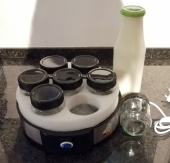Congratulations Taylor! Finding a source for raw milk is not easy and it's a blessing. I've been buying raw milk for several years and have experimented with a variety of cultured milk products. My yogurt, curds and whey are always good for at least two weeks. The milk itself will also last two weeks for drinking but the flavor changes with age. After a week it gradually starts to sour (flavor but still healthy to drink). My yogurt starts out with kind of a sweet yeasty essence, then gradually gets tangier. I don't like tangy or sour flavors much so I just add a bit of honey or jam as it gets older. One time I left a half pint of milk with a bit of cream in the fridge for at least a month+ ! The cream on top turned darker yellow and dried out a bit, the milk had slightly curdled and it tasted sour - so I just added it to a casserole. It actually enhanced the flavor and I'm still alive :)
Freezing yogurt results in edible yogurt but the texture changes dramatically to a little bit grainy and watery. Commercial frozen yogurt is whipped I believe, to achieve the creamy texture. My farmer's milk production usually slows down in winter so I sometimes can't get as much as I want so I do freeze a few pints of milk in summer when I have excess.
The only guidance I've read about how long you can keep raw milk and cultured milk products in the fridge is that you will just know when it's no longer palatable, haha! It will develop a moldy putrid smell. I suspect the two week rule came from industrial milk which is definitely yucky at that point if not sooner. The enzymes and lactic acid in raw unpasteurized milk is it's own built in mechanism to kill pathogens and bad bacteria.
If you haven't acquired Nourishing Traditions by Sally Fallon yet I highly recommend it. It's the goto book for natural foods prep, recipes as well as very educational text on nutrition and food history in different cultures. pp 80-88
I also subscribe to Sarah Pope's blog. She's a devotee of Weston Price Foundation (Nourishing Traditions) plus offers research from other current sources and cooking/recipes. Here's a relevant page (she has tons of articles about raw milk)
https://www.thehealthyhomeeconomist.com/5-tips-raw-milk-freshness/
I'm looking forward to checking out your links too James :)













 1
1





 1
1




 1
1







